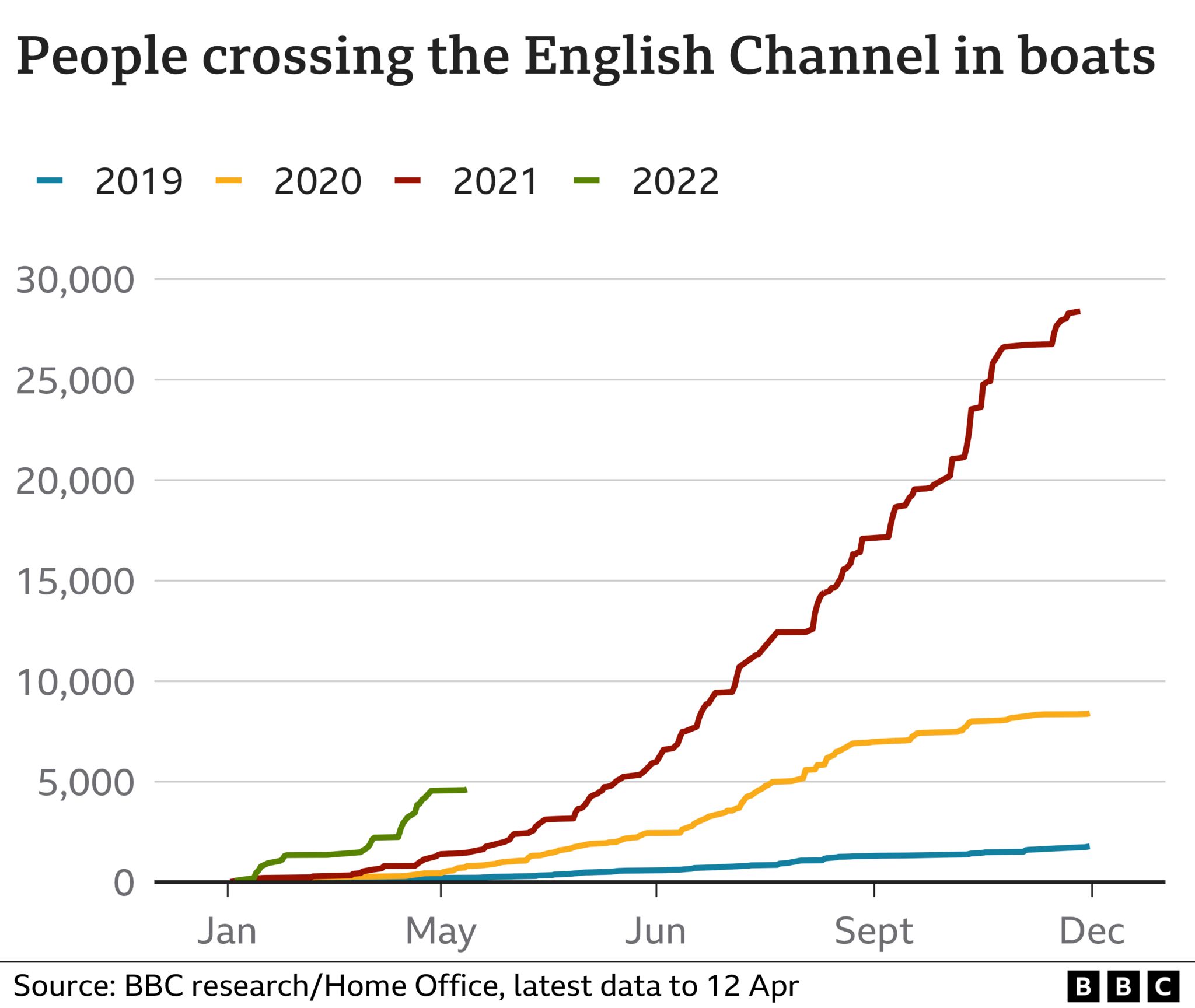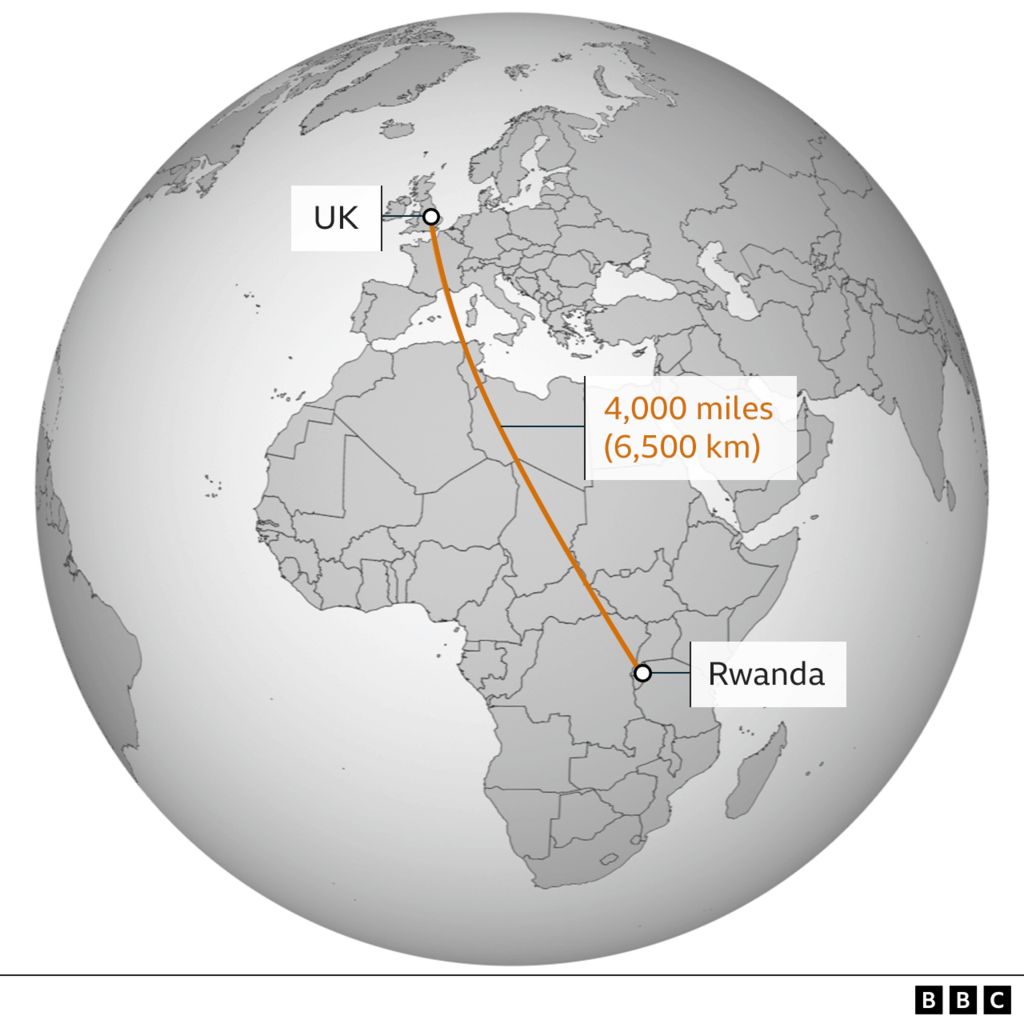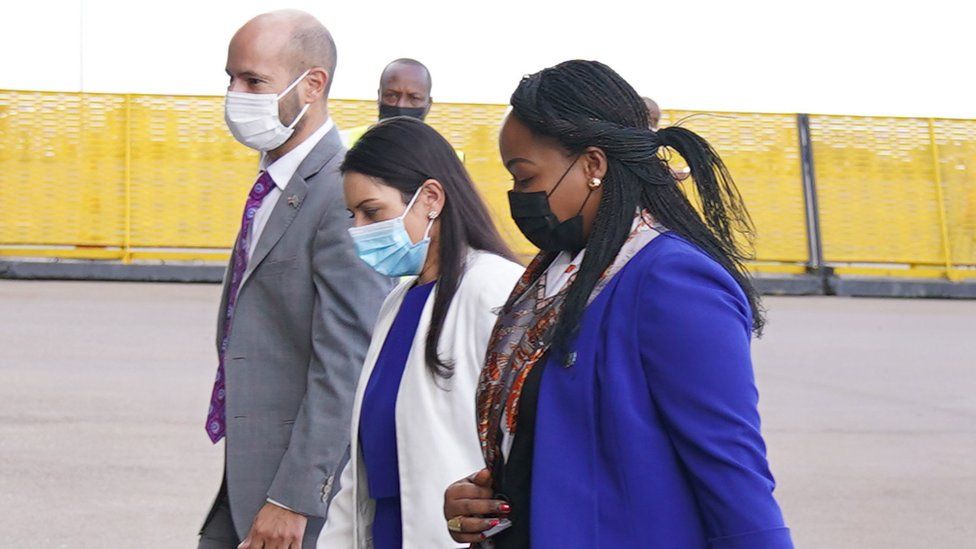Some asylum seekers who arrive in the UK on small boats across the Channel will be given a one-way ticket to Rwanda, under new government plans.
Home Secretary Priti Patel is in the African nation to agree a £120m trial involving mostly single men arriving in Britain on boats or lorries.
Prime Minister Boris Johnson said the scheme was needed to “save countless lives” from human trafficking.
Refugee organisations have criticised the plans as cruel and urged a rethink.
In a speech in Kent, Mr Johnson argued action was needed to stop “vile people smugglers” turning the ocean into a “watery graveyard”, adding the “humane and compassionate” plan was designed to break their business model.
He said he wanted to make clear to people arriving on the Kent coast they were better off taking legal routes and that the new plan would “over time prove a very considerable deterrent”.
Last year, 28,526 people are known to have crossed in small boats, up from 8,404 in 2020.
Around 600 people made the crossing on Wednesday, and Mr Johnson said the figure could reach 1,000 a day within weeks.
Mr Johnson said the scheme would be uncapped, affect those who arrived illegally since 1 January, and potentially involve tens of thousands in the coming years.
The BBC has seen accommodation the asylum seekers will be housed in, thought to have enough space for around 100 people at a time and to process up to 500 a year.
“We cannot sustain a parallel illegal system,” the prime minister said. “Our compassion may be infinite, but our capacity to help people is not.”
Opponents have also said the annual cost of the full scheme would be far higher than the initial £120m payment and raised concerns about Rwanda’s human rights record.
Labour said the plan was “unworkable, unethical and extortionate” – the Lib Dems said it would be expensive and ineffective.

BBC home editor Mark Easton, reporting from Rwanda, explained ministers face legal hurdles and substantial costs to launch the scheme.
Precise details of the plan are yet to be confirmed, but, he said the trial would be restricted to mostly single men the British authorities believe are inadmissible.
Under the proposal, Rwanda would take responsibility for the people who make the more than 4,000 mile journey, put them through an asylum process, and at the end of that process, if they are successful, they will have long-term accommodation in Rwanda.
The Rwandan government said migrants will be “entitled to full protection under Rwandan law, equal access to employment, and enrolment in healthcare and social care services”.
The UK Home Office believes existing asylum law will be enough to implement the plan, but questions remain about the legality of the scheme.

Questions have also been raised over the human rights record of the Rwandan government and its president, Paul Kagame.
A number of his critics have been killed, or been subject to assassination attempts, but Rwanda has always dismissed suggestions its government was involved.
Concerns have also been raised over the conviction of Paul Rusesabagina – the subject of Hollywood film Hotel Rwanda about his role saving more than 1,000 people during Rwanda’s 1994 genocide – on terrorism charges.
Last year, the UK government itself expressed concern over “continued restrictions to civil and political rights and media freedom” in Rwanda at the United Nations, calling for independent investigations into “allegations of extrajudicial killings, deaths in custody, enforced disappearances and torture”.
However, Mr Johnson defended Rwanda as being one of the safest countries in the world adding it was “globally recognised for its record of welcoming and integrating migrants”.
 IMAGE SOURCE,PA MEDIA
IMAGE SOURCE,PA MEDIAThe prime minister also announced:
- Asylum seekers who are resettled in the UK will be spread more evenly across local authorities
- Plans to hand operational control of the Channel to the Royal Navy
- £50m in funding for new equipment and specialist personal for Channel operations
- A new government facility to house migrants, described as a reception centre, in Linton-on-Ouse, North Yorkshire

A hugely controversial plan

The partnership with Rwanda is the centrepiece of a wider policy blitz to deal with what has been a humiliation for ministers who promised Brexit would mean control of Britain’s borders.
Instead, record numbers of asylum seekers have been turning up in dinghies beneath the white cliffs of Dover. This year has already seen 4,578 arrivals and looks set to be a new record.
Sending asylum seekers to Rwanda, however, is likely to prove hugely controversial and legally fraught.
Critics point to Rwanda’s poor human rights record. At the UN last year, the UK demanded investigations into alleged killings, disappearances and torture.
Ministers will have to explain why Rwanda is the right place to entrust with protecting the human rights of vulnerable asylum seekers who hoped the UK would protect them.

The government’s Nationality and Borders Bill includes a provision to create offshore immigration processing centres for asylum seekers.
The bill is making its way through Parliament, but with the parliamentary session expected to end within weeks, time is running out to pass it into law.
MPs are currently on a break, but when they return, they are due to review a series of amendments, including one about powers to offshore asylum claims.
The government has suffered a series of defeats in the House of Lords over the bill, which has come in for criticism and sparked protests.
Is it legal to send asylum seekers to Rwanda?
The government wants to introduce new laws – under the Nationality and Borders Bill – to make it easier for the UK to send refugees to another country for their asylum claim to be processed.
But the country must be “safe” and the UK has also signed up to two key international treaties guaranteeing refugees’ rights:
- The UN Refugee Convention, which protects people from being sent to a country where they face serious threats to life or freedom
- The European Convention on Human Rights states that no-one shall be subjected to torture, or inhuman or degrading treatment or punishment
So if there was a risk that a person would be mistreated in Rwanda then they could not be sent there.
Human rights campaigners have highlighted the negative impact on refugee human rights, the cost of the scheme, and have questioned whether it will achieve its aims.
Enver Solomon, chief executive of the Refugee Council, said the proposal would not address the reasons why desperate people travel to the UK.
Amnesty International UK described the plan as “shockingly ill-conceived idea” that would waste public money.
Shadow culture secretary Lucy Powell said Labour advocates “boring measures” like curbs on people smugglers touting for business online.
The Lib Dems said the government was “slamming the door” in the face of refugees, while the SNP’s Ian Blackford described the plan as “absolutely chilling”.
– BBC